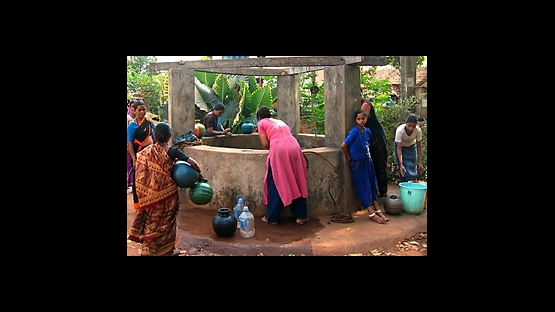In many developing countries, women and girls walk on average six kilometres each day to fetch water. They carry around 20 kilograms -- the equivalent of a cabin luggage -- on their heads.
Clean water should be a fundamental human right for everybody. But it is not, keynote speaker Ms. Maria Rauch-Kallat, a former Austrian Minister for Women and Health told participants at today´s International Women´s Day celebrations at the Vienna International Centre (VIC). "Women and Water" was the focus of this year´s celebrations.
Women are largely responsible for collecting and managing water resources in developing countries, especially in rural areas, reports from the United Nations Development Fund for Women (UNIFEM) show. Without a ready source of freshwater they may have to walk for several hours every day to find it, Ms. Rauch-Kallat said. "It greatly affects women´s daily life, not just the physical demands, but also when it comes to access to education, recreation and child rearing. As the environment deteriorates women become increasingly vulnerable. They risk sexual assault if toilets are a long walk away or unavailable. One in ten girls drops out of school when they start menstruating, if there are no proper sanitation facilities available," she said.
The U.N. estimates that 1.2 billion people lack access to safe water and about 2.5 billion are without access to proper sanitation. The IAEA is helping to facilitate the delivery of clean water to those in need, Mr. Paradeep Aggarwal of the IAEA´s Water Resources Programme said.
"By tracking the isotopes of water, scientists can quickly obtain valuable information to ´unlock´ water´s code -- establishing its source, age and renewal rate of groundwater, and whether it is at risk of contamination," Mr. Aggarwal said. By understanding the water source, countries can then "make better decisions on how to manage their precious resource in a sustainable manner, which takes account of the quality and quantity of water," he said.
The Nubian Aquifer in Africa for example, is one of world´s largest underground sources of water. Since 2003, the IAEA water resources programme has enable the countries that use the aquifer -- Chad, Egypt, the Libyan Arab Jamahiriya, and Sudan -- to develop an effective groundwater management plan.
Celebrated every 8 March, International Women´s Day is the global event connecting women around the world to focus on issues of concern, and the collective achievements of women past, present and future.


